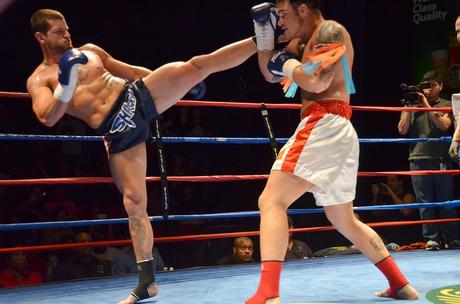
Actor Ryan Gosling isn’t just blessed with good looks; he also works extremely hard to maintain his superstar physique. The 32-year-old Canadian heartthrob reportedly hits the gym five times a week and maintains a strict diet even between movies. Last year, however, Gosling took his exercise regimen a step further with four months of Muay Thai training in preparation for his new movie “Only God Forgives.”
For those unaware, Muay Thai, or Thai Boxing, is an intense form of martial-arts known for its unique use of elbows and knees in addition to fists and feet (thus its nickname “the art of eight limbs”). The sport first became popular when people noticed how effective it was in mixed martial arts tournaments. Muay Thai then gained further popularity with both men and women when it became known as a fun and effective way to lose weight and to get into shape.
However, just because Ryan Gosling does something doesn’t automatically mean that you should too! Although there are many health benefits to Muay Thai, as listed below, there are also risks that you should be aware of. Do some research and decide for yourself whether or not you should be stepping into the ring.
Muay Thai Benefits:
Physical Fitness
Many people who practice Muay Thai do it solely for health reasons, as it’s one of the most physically demanding activities you can do. According to various reports, you can burn anywhere from 500 to 1,000 calories in a typical hour-long Muay Thai session, which is far more than with many other sports.
In Muay Thai training, you are almost always moving, keeping your heart rate high during the entire workout. More than just a cardiovascular activity, Muay Thai tests muscular endurance as well; you’re always either hitting something or getting hit, and your body needs to draw a massive amount of energy to keep up. In addition to increased strength and stamina, you’re likely to see improvements in agility and flexibility as well.
If you’re envious of Ryan Gosling’s famous ‘photoshopped’ physique, you might be pleased to know that people who do Muay Thai generally end up with extremely toned and well-proportioned bodies. The training requires you to make constant, repetitive strikes with all your limbs, helping to build muscle fast. The constant shifting of the torso will also help build up your core. Muay Thai engages the entire body in relatively equal measure – “all eights limbs” as they say – so you’re unlikely to end up with overly massive arms and chicken legs, which is something you can’t say about many weight lifters.
Neurological Strengthening
Muay Thai has often been described as an extremely violent game of chess; it not only tests your body but your mind as well. With a complex array of moves to choose from, Muay Thai boxers constantly have to make quick decisions. It’s not only about choosing where to hit your opponent, but also about choosing the right limb for the job.
Similar to how muscles are developed, new nerve connections in the brain are developed when a skill is learned or tested. After doing some Muay Thai, you’ll find that your reaction time and your spatial awareness will both be improved.
Self-Defense & Confidence
As a form of martial-arts, Muay Thai logically serves as an effective means for defending yourself. However, in addition to being able to feel safer, practicing Muay Thai is likely to raise your confidence as well.
Muay Thai is an intense experience, and those who can manage to keep up often feel a sense of accomplishment, confidence, and pride that spills over into their work and personal lives. And if there’s anything we’ve learned from Ryan Gosling and his trademark charm, it’s that confidence is really important.
For kids and youth especially, martial arts serve as an effective way to deal with bullying at school, as bullies are far less likely to pick on someone who exudes confidence, let alone someone who knows how to defend themselves.

Muay Thai Risks:
Potential Long-Term Damage
The biggest risks of Muay Thai arise from the fact that it’s an extremely intense contact sport. It does involve two people hitting each other after all.
As with all contact sports, you’re likely to experience bruises, cuts, and intense soreness in the short term. In the long term you might experience damaged joints and bones as well, especially if you never give your body ample time to heal. Broken bones and concussions are less common but can still very well happen.
For people who have done Muay Thai for roughly 12-16 years, it’s not rare to experience something called dementia pugilistica or ‘punch drunk syndrome,’ characterized by memory loss and poor coordination. Even with headgear, many scientists believe that your head will still experience concussive damage from severe blows to the head. However, this doesn’t mean that there isn’t a way to stay safe in Muay Thai. In order to avoid any risk of brain damage, you can always agree to use the ‘not-the-head’ rule whenever you spar with others.
Overwhelming for Beginners
Especially for those with no prior experience in martial arts or contact sports, Muay Thai can seem extremely tough at the start. Training sessions usually have an allotted time for stretching at the end, but even so, your body is going to feel like it’s been hit by a car. Many people instead choose to work up to Muay Thai, starting with regular boxing first, then moving to kickboxing and finally switching to Muay Thai when a level of readiness has been achieved.
Gosling may have survived his intense Muay Thai training, but the actor has also been keeping fit and physically active for his entire career. If you’re interested in trying Muay Thai, first assess your own level of physical fitness, including your tolerance for soreness and pain, and decide whether or not Muay Thai is right for you.
Be Sociable, Share!
